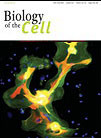Szabó P, Kolář M, Dvořánková B, Lacina L, Štork J, Vlček Č, Strnad H, Tvrdek M, Smetana K Jr. Biol Cell. 2011 May;103(5):233–48 IF: 4,898

Abstract:
BACKGROUND INFORMATION: Multipotent mesenchymal stem cells can participate in the formation of a microenvironment stimulating the aggressive behaviour of cancer cells. Moreover, cells exhibiting pluripotent ESC (embryonic stem cell) markers (Nanog and Oct4) have been observed in many tumours. Here, we investigate the role of cancer-associated fibroblasts in the formation of stem cell supporting properties of tumour stroma. We test the influence of fibroblasts isolated from basal cell carcinoma on mouse 3T3 fibroblasts, focusing on the expression of stem cell markers and plasticity in vitro by means of microarrays, qRT-PCR (quantitative real-time PCR) and immunohistochemistry. RESULTS: We demonstrate the biological activity of the cancer stromal fibroblasts by influencing the 3T3 fibroblasts to express markers such as Oct4, Nanog and Sox2 and to show differentiation potential similar to mesenchymal stem cells. The role of growth factors such as IGF2 (insulin-like growth factor 2), FGF7 (fibroblast growth factor 7), LEP (leptin), NGF (nerve growth factor) and TGFβ (transforming growth factor β), produced by the stromal fibroblasts, is established to participate in their bioactivity. Uninduced 3T3 do not express the stem cell markers and show minimal differentiation potential. CONCLUSIONS: Our observations indicate the pro-stem cell activity of cancer-associated fibroblasts and underline the role of epithelial-mesenchymal interaction in tumour biology.
-im-
